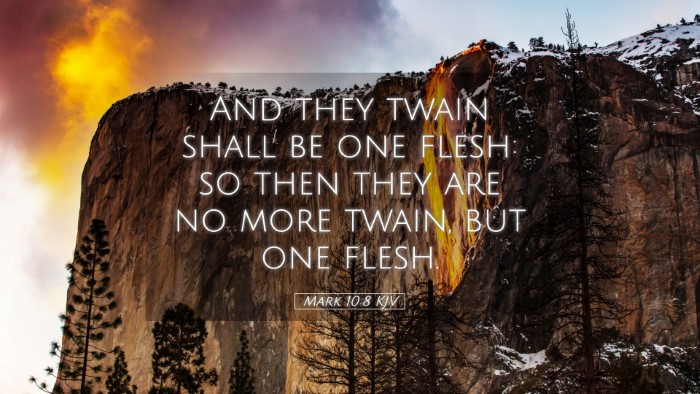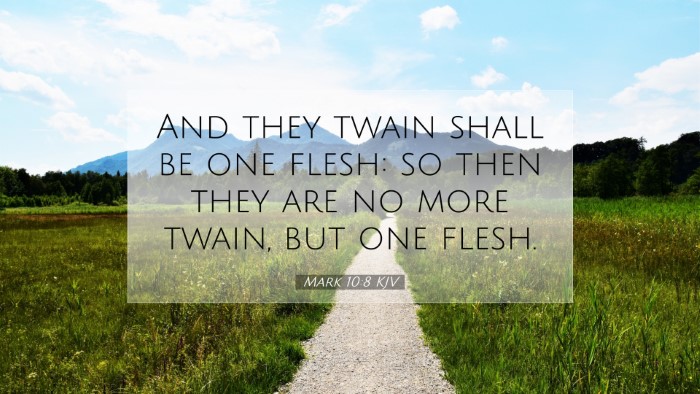Bible Commentary on Mark 10:8
Verse Context: Mark 10:8 reads, “And two shall become one flesh; so they are no longer two but one flesh.” This verse is part of a conversation Jesus has about marriage and divorce, drawing on the creation narrative to express God’s intention for the union between man and woman.
General Overview
This verse encapsulates the divine principle of marriage as established in Genesis. The concept of two individuals becoming one flesh suggests a profound unity that transcends physical aspects and encompasses emotional and spiritual dimensions.
Theological Significance
The phrase “one flesh” is pivotal in understanding the sanctity of marriage.
- Unity: The unity called for in marriage reflects the relationship between Christ and the Church.
- Divine Intent: Marriage is ordained by God. The reference to “one flesh” indicates that the Creator’s intent is for marital unity to signify completeness.
- Indissolubility: This verse underlines the ideal of marital indissolubility, emphasizing that divorce was not part of God’s original plan.
Commentary Insights
Insights from Matthew Henry: Henry emphasizes the significance of the union in marriage as a divine institution that reflects God’s image. He points out that when a man and woman marry, they are meant to unite their lives thoroughly, which entails physical, emotional, and spiritual commitment. This unity is not merely a social contract but a sacred union that symbolizes the relationship between Christ and his Church.
Insights from Albert Barnes: Barnes notes that the reference to “one flesh” signifies a complete partnership in every aspect of life. He explains that this phrase encapsulates the idea of mutual support and shared purpose, asserting that such a relationship should not be lightly severed. Barnes emphasizes God’s design for marriage as a permanent bond, urging believers to uphold this ideal, even amidst cultural shifts towards the normalization of divorce.
Insights from Adam Clarke: Clarke offers a detailed exploration of the Jewish customs surrounding marriage, explaining how Jesus’ teaching here challenges prevailing attitudes towards divorce in His time. He highlights that the “one flesh” concept implies a relationship of deep intimacy and mutual obligation. Clarke echoes the sentiment that marriage is a covenant rather than a contract, suggesting that true understanding of “one flesh” can lead to richer, more fulfilling marriages.
Practical Applications
For pastors and leaders:
- Teaching on Marriage: Use the understanding of “one flesh” to teach couples about the depth of commitment in marriage. Highlight the need for communication, support, and mutual respect that reflects this unity.
- Counseling: In counseling sessions, refer back to this principle to help couples navigate conflicts and remember their covenantal bond.
For students and theologians:
- Researching Biblical Union: Consider exploring how the concept of “one flesh” is reflected in the New Testament and its implications for contemporary Christian living.
- Examining Cultural Context: Investigate how cultural barriers influence understanding of marriage and the concept of unity in diverse communities today.
Conclusion
Mark 10:8 serves as a powerful reminder of the sanctity of the marital union and the intent of God’s design for relationships. Understanding that two become one flesh lays a foundation for individuals and communities to affirm God’s vision for love, unity, and commitment in marriage.


